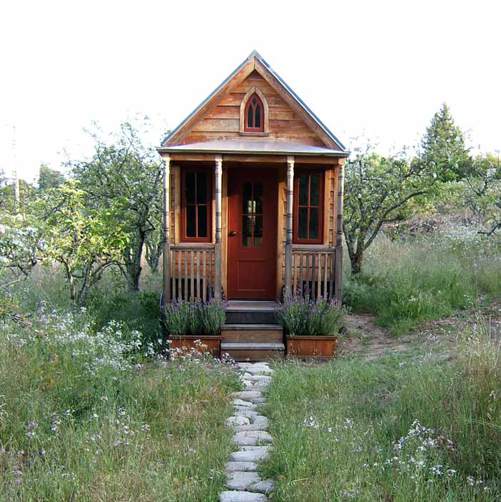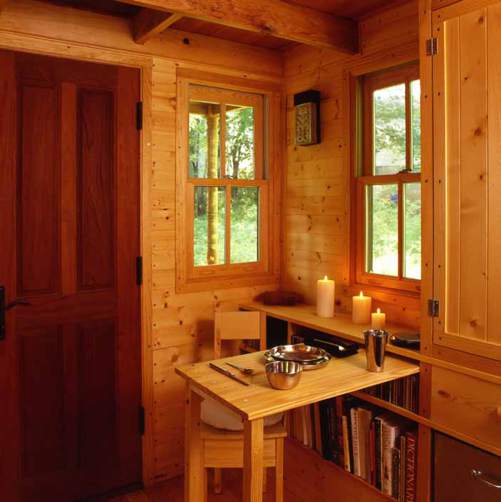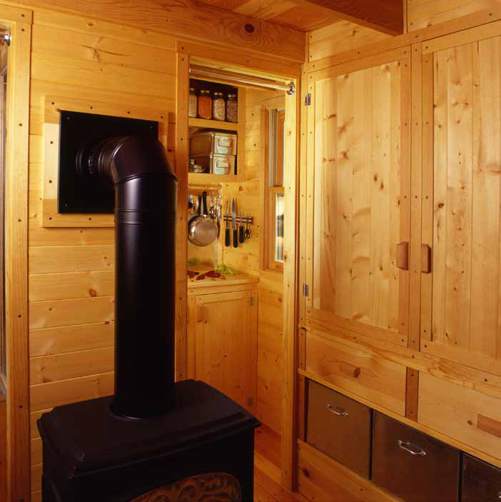The Small House Book (2 page)
Read The Small House Book Online
Authors: Jay Shafer

house looked a bit like a tiny cathedral on two, 3,500-pound axles.
The key to designing my happy home really was designing a happy life, and
the key to that lay not so much in deciding what I needed as in recognizing
all the things I can do without. What was left over read like a list I might make
before packing my bags for a long trip. While I cannot remember the last time
I packed my TV, stereo, or even the proverbial kitchen sink for any journey, I
wanted this to be a list of items necessary not only to my survival, but to my
contented survival. I am sure any hard-core minimalist would be as appalled
by the length of my inventory as any materialist would be by its brevity. But
then, I imagine nobody’s list of necessities is ever going to quite match any-
body else’s. Each will read like some kind of self-portrait. I like to think that a
house built true to the needs of its inhabitant will do the same.
10
Tumbleweed (facing page)

Utilities
Like the rest of the house, utilities and appliances were designed with sim-
plicity and sustainability in mind. They met my modest needs but would be
considered primitive by conventional American standards. These rudimen-
tary utilities certainly would not appeal to everyone interested in living in a
small home, and it should be made clear that living small does not require
deprivation. Hot and cold running water, a microwave oven, and cable TV are
all available options.
Water: Tumbleweed was supplied by a simple, gravity-fed plumbing system.
A two-and-a-half-gallon pot sat on a metal shelf just above a horizontal sec-
tion of stovepipe in the overhead kitchen cabinet and drained into either the
kitchen sink or shower through a Y intersection in a short stretch of rubber
hose. The water was kept warm as long as the heat stove was on, and it
could be made hot by setting the pot directly on the stove or a burner. The
pot was filled at a nearby spigot. Gray water drained directly into the garden.
Heating and Cooking: The best source of heat most structures can use is that
of the sun. I installed windows on all but what was intended as the north wall
of Tumbleweed for good solar gain. A covered porch on the south side kept
the heat of the high summer sun out while letting the lower winter rays flood
the house with their warmth. A gas heater kicked in on cloudy days and cold
nights. I chose a gas stove over a wood one mostly because gas stoves only
require about one-sixth as much clearance from flammable surfaces. This,
in turn, allowed me to have pine walls without having to put my heater right
in the middle of an already tiny room. The cleanliness of gas also seemed to
make sense in a small space, and I liked the idea of precise control with a
thermostat rather than the frequent stoking that a small wood stove requires.
12
The propane tank that fed the heater also supplied an R.V. cooktop. It is upon
this same double burner that a camp oven was set for baking.
Toilet: My composting toilet amounted to little more than an airtight bucket,
a can of sawdust and a couple of compost piles outside. Sordid story short,
the bucket was used as an indoor toilet and sawdust was put into the mix
to absorb odor and balance out the carbon-to-nitrogen ratio. This bucket
was emptied onto one compost pile or the other every so often, then rinsed.
(Please see J.C. Jenkins,
The Humanure Handbook
, for details on this and
other methods of composting human manure.) While the idea of carrying
one’s own poop (or anybody else’s for that matter) to a compost pile off
away from central living quarters may sound both inconvenient and plainly
unacceptable to most Westerners, its appeal for more than a few will be its
absolute efficiency. Without electricity, running water, or waste and only small
inconvenience as its price, a cleaner environment and soil-building compost
are made available.
Electricity: By now, these description of rudimentary plumbing and a plastic
chamber pot may have made it sound as if my house was more derelict than
homey. But, as I have said, these utilities were of my choice, and for me,
choice is, in itself, a luxury. In fact, there was plenty of room for modern con-
veniences. The integral CD player, TV, and VCR disqualified the house as
an ascetic’s shanty. These appliances, along with six lights, two fans, and a
radio, were all powered by the sun through a single solar panel. I chose not
to mount the panel on my roof but kept it separate. This allowed me to situate
the house in a shady place during the summer while collecting energy at the
same time.
13



Camping Out
I had managed to side-step building codes
by constructing not a building, but a “travel
trailer.” With that stumbling block out of the
way, I still faced a zoning problem. I want-
ed to live in town, and, like most towns,
Iowa City does not allow trailer camping
just anywhere. You cannot just buy an old
lot and park there indefinitely. The restric-
tions do, however, allow for “camping out”
in one’s own backyard.
Upon discovering this, I snatched up a
small fixer-upper on a large wooded par-
cel and proceeded to set up camp. The
rent collected from the big house covered
the ensuing mortgage and taxes. I would
“camp out” in my own backyard for the
next five years before selling the property
and heading West.
California
In 2005, I moved to the San Francisco Bay Area. I had heard a lot of horror
stories about the price of properties in the region, so I sold Tumbleweed and
built myself an even smaller house to take with me. I figured I had better have
something I could parallel park, in case I had to live on the street for a while.
Tumbleweed’s desk (left) and gas heater (above)
15

Tumbleweed’s ladder (above), kitchen (opposite) and exteior (page 18)
16


